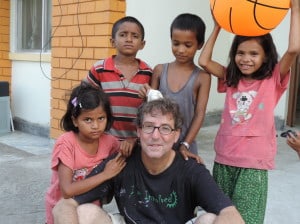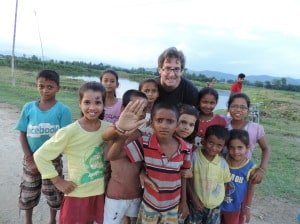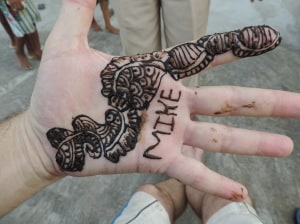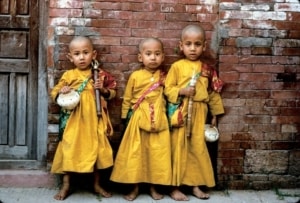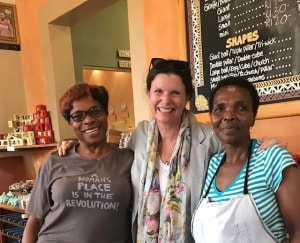Mike Rosenkrantz has spent the past few years working and volunteering in Nepal. He wrote Living in a Village in Nepal for this website and it has been very popular. Mike continues to live in Nepal and he kindly agreed to the following email interview with me. I know you find it interesting and helpful.
John: What inspired you to go on your first international volunteering assignment?
Mike: When I was a teenager I had this vision of working overseas, a “save the world” mentality. I thought that I would become a dentist and have some “hard” skills. However in college I found out that my science skills were lacking.
I never gave up on my wanting to live/work overseas and when my children left home I started thinking about how I could do this. In 2006 I applied for the Peace Corps however I ended up taking a job in the States.
It wasn’t until March 2009 that I started my overseas volunteering experience through VSO. I went to India which I visited with my children and sister and brother-in-law in 2006. I have a very good friend, Onkar Kakar, who I went to business school with in Boston, who lives in Calcutta. I immediately fell in love with India. From this time I knew that I would go overseas to live and work, it was just a question of when.
I’m not so much into “saving the world” but I do know that I have an impact especially on children and I hold this very sacred. My life is about serving others, somewhat like my father and my son who is a monk. I’ve been privileged to have grown up in the US and become highly educated. I want to give this back to those who don’t have these opportunities, only because of where they were born or what ethnic group they are part of. This is primarily what I’ve learned from five plus years of overseas work.
John: What type of work did you do prior to your assignment and how did it fit into your volunteer work and life?
Mike: I’ve been director of NGOs, the Alliance for Living in New London, CT, an HIV/AIDS NGO and the Central Market in Lancaster, PA. I’ve also been Director of the Welfare Department for the City of New London and Assistant Town Manager in Groton, CT. All of these jobs have led me to volunteering/working overseas. I’ve been able to apply what I learn, but have also needed to be highly flexible and adaptable. I’ve learned a lot about organizational development and try to apply this in this case in the Indian and Nepali context.
This is a major challenge for me, as I have a vision of the possibilities, but in a western sense. I need to convey this in a more appropriate, e.g. Nepali context. At times I have major internal clashes about this. At these times I know that I need to just sit and slow down and really think things through involving those I’m working with.
John: I know from my own experience that it can be difficult to adjust to both a new environment and culture far from home. Can you describe some unique experiences you had while adapting to a new and different culture?
Mike: From the first time I went to India in 2006 I was very comfortable; maybe I’ve lived in India in past lives. The adjustments have been about the weather, especially when I lived in New Delhi and it was just so hot during the summer. That first summer I lost weight. I just didn’t feel like eating. In my current job at Phul Kumari Mahato Memorial Hospital in Karjanha, Siraha, the weather has again been a factor as it is very humid here. I haven’t been able to exercise as much as I would like.
Having frogs, sometimes rats, lizards and bugs in my house is something that I deal with. I hate the frogs because they poop all over but I just chase them out when I find them. Adjusting to the food hasn’t been that difficult, although now living in a village there isn’t the range of foods that was in New Delhi and Kathmandu. It doesn’t matter that much because I get fresh paneer from the Hospital canteen. I get fresh vegetables and fruit at the local markets, which is great for me because I’ve always loved open air markets.
I don’t like people staring at me but it is a fact of life, especially since I’m living in a village and there are only a few westerners here.
It is all unique to me and I’ve taken tens of thousands of photos all on my FB page from living overseas for more than five years.
The adjustment actually comes when I visit the US; a reverse culture shock. The longer I live away from the US the less I feel connected to the culture. I will always come to the US to visit family and friends, but in the longer term I’m not sure I will ever go back to live there.
John: Is there one particular event or time you remember when the thought occurred to you that “I have adapted!”?
Mike: I think after a few months of living overseas, when I was eating properly, coaching basketball at the Delhi YMCA every week, making new friends, which I do fairly easily and also because I’m a westerner. It isn’t that difficult, sure I get frustrated, but it’s more about me and my specific way of thinking than anything else. One thing I learned from VSO was flexibility and I try to do this, to stretch beyond any self-imposed limits and understand others.
I enjoy being a “Stranger in a Strange Land”. Maybe I feel as if I can bring more due to this; because I’m not just part of the scenery. I’ve always wanted to be a teacher and I do a lot of that here, but I’m also a learner. This has all helped me to adapt.
John: I noticed in some of your photographs that interactions with children have been a big part of your volunteer service. How do you feel these interactions have contributed to both their lives and yours?
Mike: In both my volunteer and working life children have always been important. We’ve just started a library in Karjanha Village, where I’m working now and the experience has been incredible. The question is how do we harness this energy to make positive changes? Children are the way into working with parents. If one is trusted with children, and I am, it will make it easier to do development work.
But it goes beyond this. I’ve always loved children, something I inherited from my mother’s father and my mother. I have two adult children now but I feel as if I’m the father of so many more. Often I can give advise and talk about things which children’s parents cannot (at times due to culture). Through FB (Facebook) I have children in India, Nepal, Afghanistan, etc.
I will always work with children to help them to grow and better their lives. This is vital if the world is ever to change from one of hate to one of love.
John: Can you describe a particular example of where you know you made a positive impact on someone’s life?
Mike: Through having coached basketball in India and wheelchair basketball in Nepal I know that I’ve had an impact. But I have an impact everyday; it’s a matter of how I treat others, respectfully, except at times, when I’m frustrated, with respect. I talk to children as if they are adults and I know that this has impacted so many.
In my office at the Hospital there are always children in the room. (I have a basketball hoop on one of my doors). I know that I’m providing a glimpse into a different kind of future, one that hopefully leads to improvements for this Village, but one which goes beyond. However I am only the facilitator, I can’t “do” for others, otherwise we create a dependency situation, which is anti-development.
John: What has been the hardest part of your volunteer service?
Mike: I think in both volunteering and working overseas, realizing that people have very different perspectives. I may think that I see a situation clearly, but it’s not necessarily the case until you hear the other person’s perspective. This has helped to broaden my thinking. It’s not that I will give up my core beliefs, but it means that I try to be open to others.
When I see photos of family events I feel a twinge in my belly. I miss a lot but thanks to social media I can keep up. It’s not that I would attend all of the events but you know I really don’t have the opportunity. I’ve been thinking quite a bit about this recently. However I feel as if I’m part of something which is so much larger than myself and although on some level this is scary, on another, it helps me to get out of my own stuff and serve others.
John: Do you have some thoughts about important points a prospective volunteer should consider when choosing their first volunteer assignment?
Mike: Find a part of the world which you love or want to explore and try to go there. VSO offers many assignments for older people; it’s a very good organization. This provides a “safety net”. With my first overseas job the challenge was whether I could do this without the benefit of a volunteering agency and so far it is working out due to my five years of volunteering.
More importantly just be open and flexible to learning and doing things differently than one is used to. It’s somewhat a curiosity and a need for first hand knowledge, one that you can’t get through movies or books. This results in a much greater understanding of others and helps one appreciate the diversity which exists on this planet.
John: You have been working and volunteering internationally for a number of years. What traits or habits have you observed that differentiate a successful volunteer from and unsuccessful one and vice versa?
Mike: One has to be flexible especially when things don’t go right. One has to have outlets, for me basketball, movies, music, children. Those who are rigid are wasting their time. One has to be curious and somewhat of an explorer, have a lot of empathy, selfless, an ability to adapt to different foods, have a strong sense of self or at least a base which can be added to.
John: How has international service changed you?
Mike: I am such a different person, maybe somewhat due to maturing but I’m much more confident of my abilities to think on my feet, listen to others, be kind, try to really understand other’s situations. I’m not a vanilla box anymore but am a rainbow. But I have a long way to go. I think this lifetime has been about growing up and expanding my horizons but I know that I still have a long road in front of me, that I’m still a young soul.
John: Thank you, Mike.
MIKE’S LESSONS LEARNED:
- Life is never black or white but various shades of gray; nobody is always right or wrong; it is all a matter of perspective.
- Everyone can contribute towards society. One just has to act locally and think globally.
- Aging and growing in life is positive as long as you can stay healthy and take your knowledge and apply it on a number of fronts.
- Working with a diversity of people and being flexible is exactly what development work involves.
- The best thing we can do is to serve others.
Photos courtesy of Michael Rosenkrantz.

